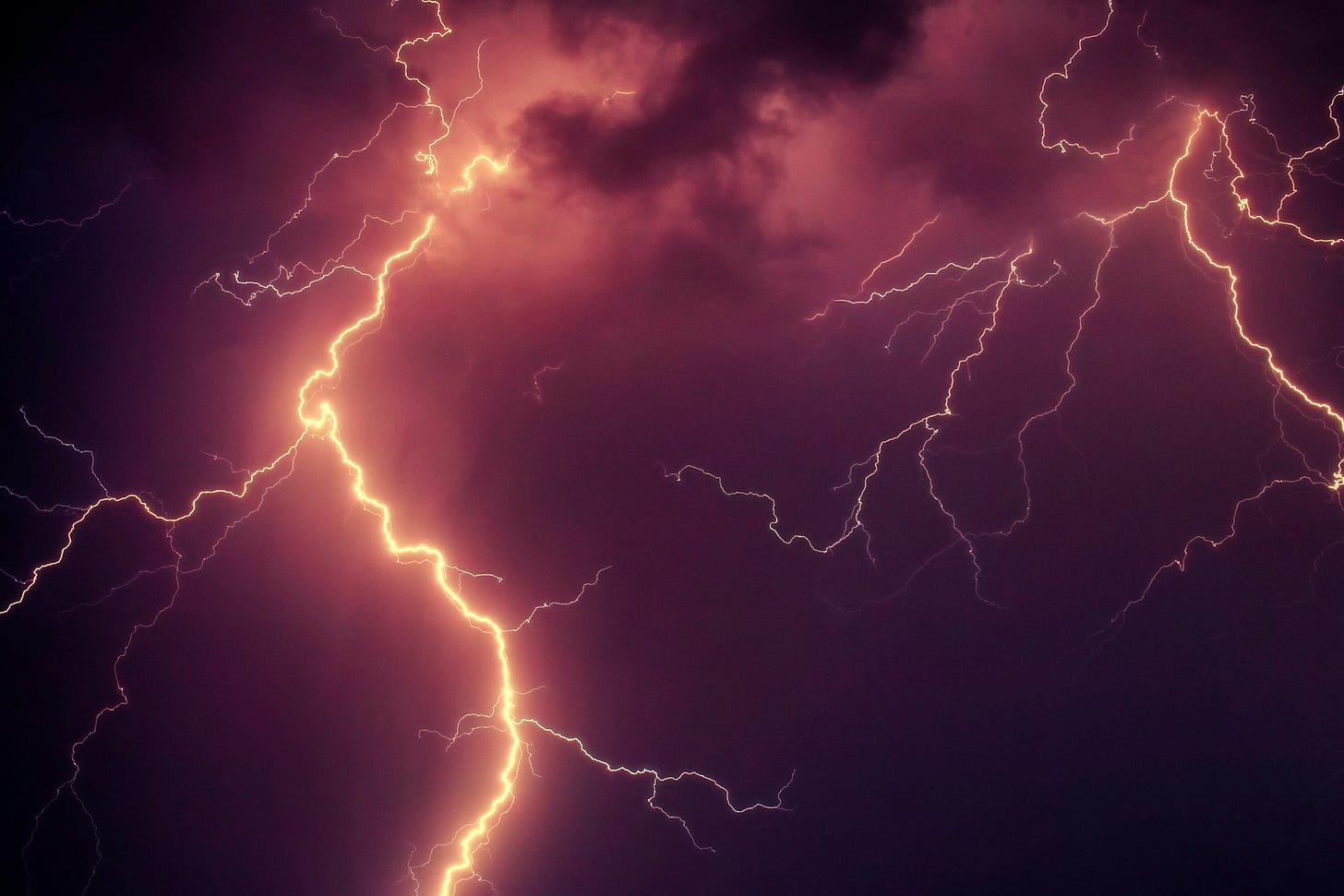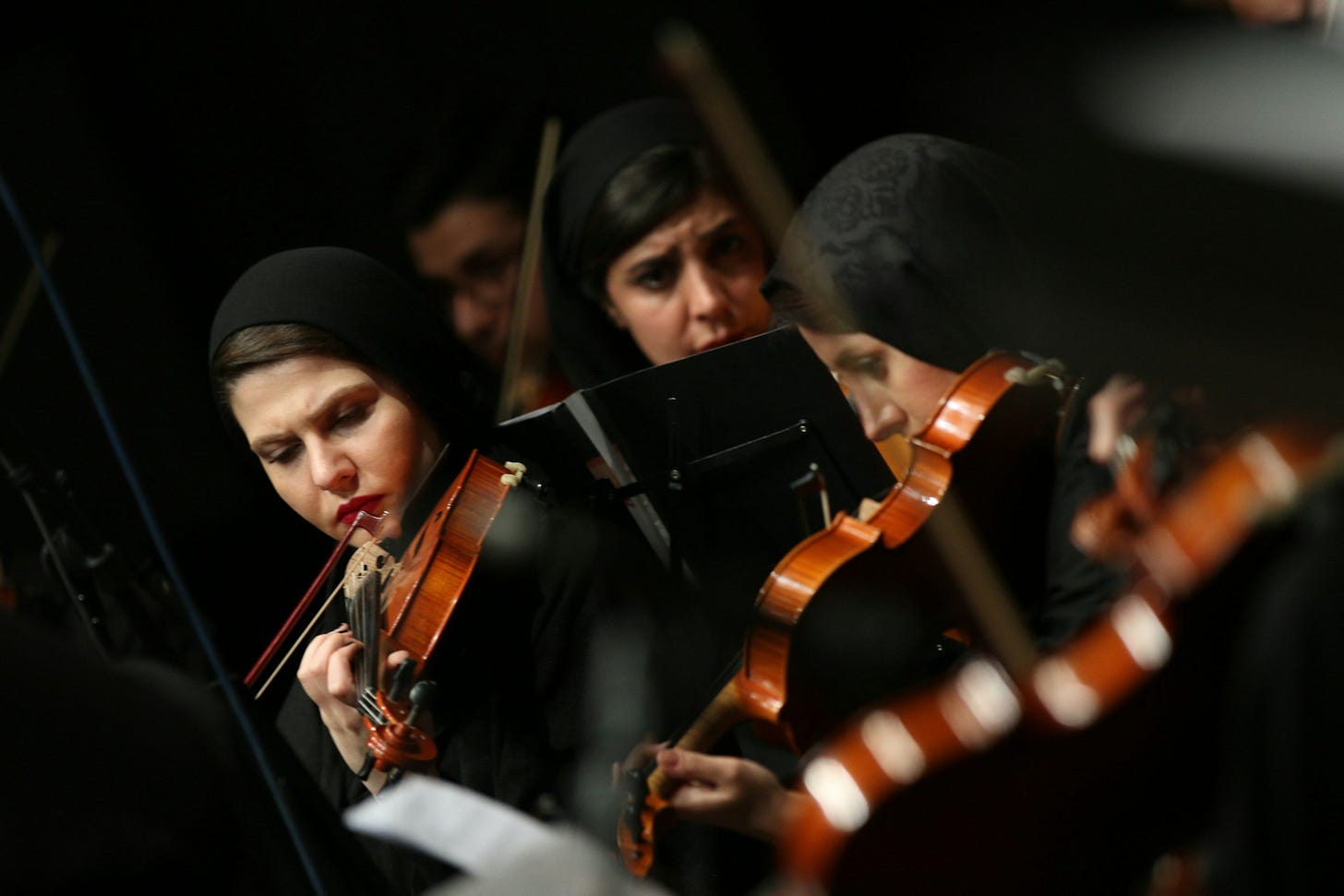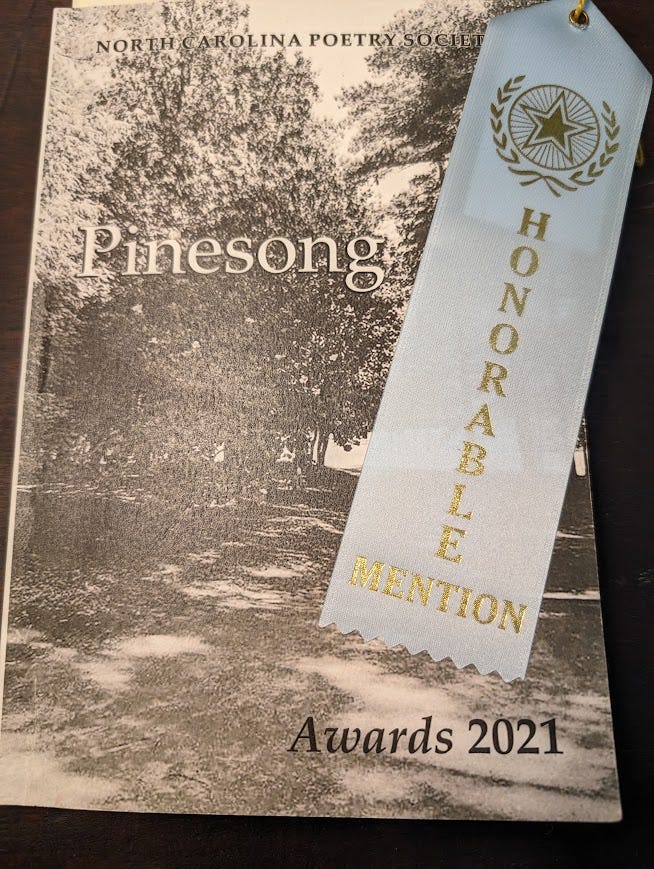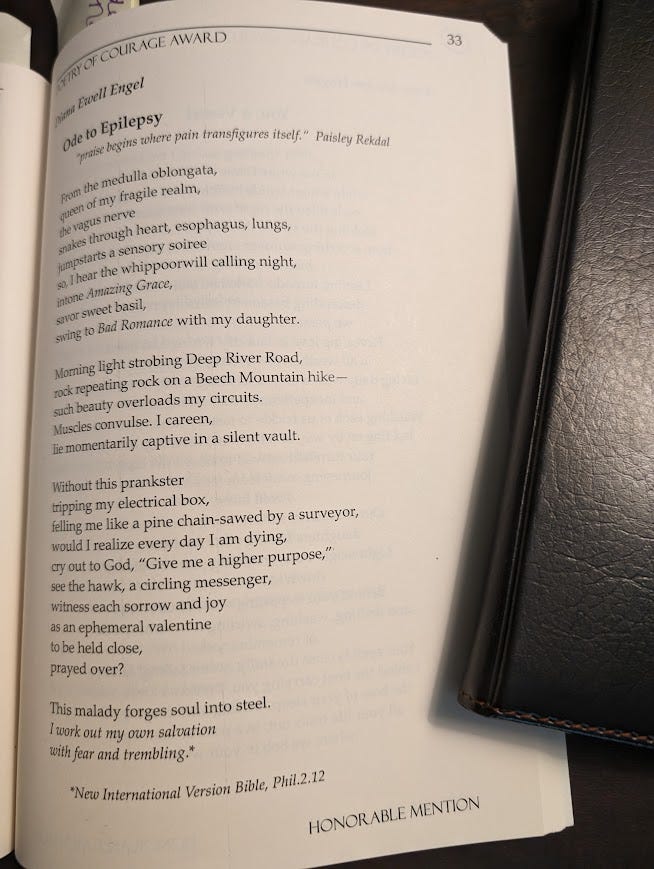Photo of Mount Fuji and Japan: Our view from the plane by Diana Ewell Engel
Odes, Chapter 4, Part 2 The Search for the Silver Lining
Good evening, Seized Friends!
The beauty of spring and the slate of events which the season brings to my region are a salve after a dreary winter. April ushers in Poetry Month with all manner of readings and workshops throughout my state. May opens the gates to festivals, outdoor concerts, and sporting events.
For those of us who live with compromising health conditions, such a season may prove affirming and lift our spirits or may alternately remind us of our physical and/or mental limitations.
I have lived with epilepsy for some time. Fortunately, I have been seizure-free for a number of years thanks to an excellent neurologist and an anti-seizure medication. Even so, experiencing a seizure is a terrifying event. Seizures, like heart attacks and strokes, temporarily take away bodily control.
I faced difficult consequences in May 2018 when my husband and I flew to Newark enroute to spending a week with our daughter in Japan. We had planned to see the sites with her, following her study abroad semester there. Unfortunately, my body had other plans. After I suffered a grand mal seizure in Newark Airport, the ER doctor insisted that we fly home, and that I should see a neurologist as soon as possible.
The crushing disappointment of missing time with our daughter in a country she loved along with the fear that accompanies epileptic seizures stole my joy for a number of months.
I turned to writing to process my pain, and to consider what benefits I derive from living with epilepsy.
Photo by VD Photography on Unsplash
The result is my poem which follows, “Ode to Epilepsy.”
Ode to Epilepsy praise begins where pain / transfigures itself. -Paisley Rekdal From the medulla oblongata,/ queen of my fragile realm,/ the vagus nerve/ snakes through heart, esophagus, lungs,/ jumpstarts a sensory soiree/ so, I hear the whippoorwill calling night,/ intone Amazing Grace,/ savor sweet basil,/ swing to Bad Romance with my daughter./ Morning light strobing Deep River Road,/ rock repeating rock on a Beech Mountain hike:/ Such beauty overloads my circuits./ Muscles convulse. I careen,/ lie momentarily captive in a silent vault./ Without this prankster/ tripping my electrical box,/ felling me like a pine chain-sawed by a surveyor,/ would I realize every day I am dying,/ cry out to God, “Give me a higher purpose,”/ see the hawk, a circling messenger,/ witness each sorrow and joy/ as an ephemeral valentine/ to be held close,/ prayed over?/ This malady forges soul into steel./ I work out my own salvation/ with fear and trembling.* / * New International Version Bible, Phil.2.12 -Diana Ewell Engel, Honorable Mention for the “Poetry of Courage” Award and published in the North Carolina Poetry Society’s Pinesong Awards 2021 issue.
Photo by Rachel Walker on Unsplash
My “Ode to Epilepsy” Writing Journey
I struggled to make a seizure real with my words. While I knew how scary it felt to lose consciousness, convulse, and fall, I faltered with how to make my reader feel this. I knew not to use adjectives such as “terrifying,” “dark,” and “painful” which merely tell without showing what the experience is like.
Although I had a rough understanding of epilepsy and what happened during a seizure, I didn’t have the words at my fingertips. I figured that by learning more, I might jumpstart my writing brain and puzzle out a few apt metaphors.
Online, I learned about the electrical storm set off by malfunctioning neurons, how they can rapid-fire and short circuit the brain. The most revealing information concerns the vagus nerve, a major transmitter of electrical pulses, and how it becomes the pathway to a seizure. I was surprised to learn that the vagus controls everything from swallowing to singing and dancing. That knowledge created a way to begin my poem, an opening for exploring the positive sensory experiences that occur due to this critical nerve.
Photo by Johannes Plenio on Unsplash
Additionally, as a poet, I’ve trained my mind to listen to the sounds of words I choose.
Music matters in poetry. Poems are song-like forms, and well-chosen musical words can reinforce the poem’s or stanza’s meaning, and they add to the beauty of the verse. Notice the word medulla oblongata. As you sound out these words—meh-duh-lla ob-lon-gah-tuh—listen to the rippling effect of the uh, the la and the o’s, the musical echo. Now notice the other incidences of melody in this first stanza, the whippoorwill calling and the dance with my daughter to a Lady Gaga tune.
The medulla oblongata is where the vagus nerve begins; it connects the brain stem and the spinal cord. I chose to compare it to a queen reigning over my brain and body, a fragile realm. My first metaphor, I thought. I’ve begun this poem!
Back to musical language: In the first stanza, the sibilant s repeats to make a “z” sound with these chosen words: vagus, snakes, esophagus, jumpstarts, sensory, soiree, savor, sweet, and swing. If you read this stanza aloud, you’ll notice the hissing snake-like sound, an intentional effect that creeps like fear.
The r sound creates alliteration—the repetition of beginning sounds in words—and consonance—the repetition of consonant sounds within words—throughout each stanza. Here’s a sampling: fragile, realm, through, whippoorwill, Grace and Romance (which also is sibilant with its zh sounds ; )), daughter, strobing, rock, repeating, circuits, careen, prankster, tripping, electrical, surveyor, work, fear, and trembling. The repetition of hard-sounding consonants give a poem “teeth,” a rough edge.
Photo by Parizan Studio on Unsplash
In contrast to the first stanza’s happy sensory images such as the whippoorwill calling and the dance with my daughter, the next stanza shows, again through imagery, what leads to a seizure. I drew from my precarious experiences that involved strobing light and the repetition of patterns.
Always, when writing, ask yourself, “What experiences have I enjoyed or endured that I can transform into sensory images for myself and for my reader?”
To make my seizure real, I chose the present tense verbs convulse, careen, and lie. I’m briefly riffing with the c sound, and my brain plays along, offers the word captive. Pay attention to what your mind offers and record it. The more we practice our creative writing, the more likely we will be rewarded with the perfect word! We’re training our minds in the work of word and image seeking.
The third stanza is the crux and the turning point of my poem where I ‘announce’ through a list of images that this is an ode, a poem of gratitude. Here I cluster the negative and positive. I compare the vagus nerve to a prankster / tripping my electrical box that fells me like a pine chain-sawed by a surveyor. While I wrote this stanza, I thought of the apostle Paul and his sermon to the Philippians, remembered his dramatic plea to “work out salvation with fear and trembling.” This image resonates with the sudden strike of a seizure and its resulting anxiety.
Photo by Molly Wright on Unsplash
So, my ending becomes a reference to that verse, and I precede those lines with a declaration. The line, This malady forges soul into steel, characterizes the benefit of a transformed, resilient soul, so strong that it is like forged steel, as my crowning glory of living with epilepsy.
As I worked steadily on this poem, my words and images came more readily.
When we’re willing to slog through the swamp of poem-making, we may be rewarded by a sudden momentum, a rush of words and images, brought on by hard-earned inspiration! This is truly thrilling and well-worth our efforts.
How Self-Reflection Can Bring Gratitude
In living through epilepsy and other difficult experiences, I’ve developed coping mechanisms, and one of the more helpful tools for me is the search for the silver lining. You may be familiar with the cliche, “Every cloud has a silver lining,” meaning for every trial, there is something that redeems it, makes it worthwhile.
I readily concede that there are excruciating events that affect us so intensely that recovery may take the rest of our lives.
Even so, in the face of disappointment, illness, and hardship, I know that one way to restore our emotional health is to reframe our perspective and how events affect us, to do our best to minimize their negative effects. This isn’t the same attitude as looking at the world through rose-colored glasses. No. For example, I don’t live in denial of my epilepsy. I live with it and take care of myself accordingly.
Photo by Emma Simpson on Unsplash
Consider your personal wounds brought on by your life experiences and/or illnesses. Use writing to process your suffering: Record everything these events have taken from you: Write about your sorrow and anger.
These are legitimate responses, and there are many powerful poems that give voice to poets’ sorrows and resentments.
Once you’ve emptied your mind of the negative, consider the positive. Ask yourself, “How has this experience shaped me and/or my life in a better way?” Now record those benefits.
Use your free-write of the negative and positive as the basis for your poem. Your poem doesn’t have to be an ode. Your poem can become whatever you want or need it to be.
For me, such writing is therapeutic. By getting my thoughts on paper, I learn how I think and how I feel. What I write frequently surprises me; not all of my thoughts are what I expect. This process helps lighten my emotional load and lends perspective and clarity to my life—I see how to move forward with joy.
Photo by Diana Ewell Engel
Today’s Organization Picks
Take stock of the writing organizations available where you live. In North Carolina, we’re fortunate to have a strong association, the North Carolina Writers Network, which offers critique groups, workshops, conferences, writing competitions, and publication opportunities. The North Carolina Poetry Society provides content-rich offerings of a similar kind related to poetry. You aren’t required to be a tar heel ; ) to join these groups. When thinking of joining any organization, you’ll want to consider their offerings and the membership fees. Writing is a lonely craft. We need community and nurture. Take the time to find groups which will prove best for you in your writing journey.













Beautiful, and Ken’s comments, especially the bravery part, are spot on.
I think it also takes a bit of bravery to look deeply at such painful conditions/events that shape our lives in order to reframe them. It is a powerful poem. I love the image of Fugi in the distance, beautiful but destructive, and like epilepsy, it’s always there waiting to erupt and reshape.